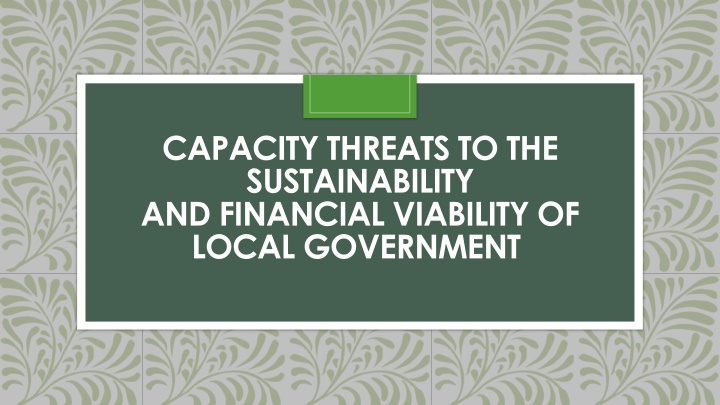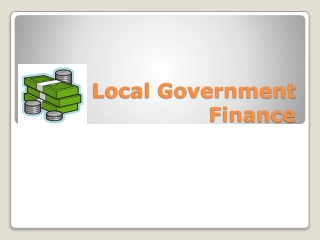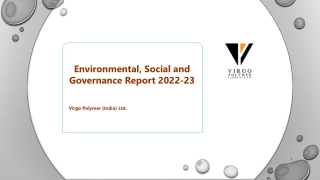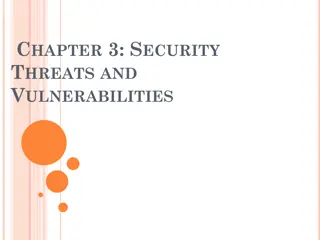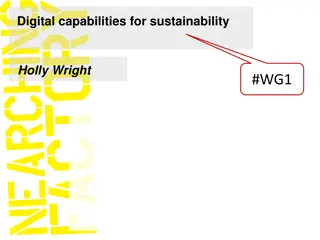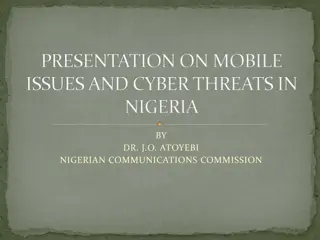Capacity Threats to Local Government Sustainability
Achieve sustainable and financially viable local governance through addressing challenges and building capacity in South Africa, focusing on weaknesses in governance, financial management, and institutional structures. Explore key achievements, challenges, and the background of the sector to lay foundations for improvement.
Download Presentation

Please find below an Image/Link to download the presentation.
The content on the website is provided AS IS for your information and personal use only. It may not be sold, licensed, or shared on other websites without obtaining consent from the author.If you encounter any issues during the download, it is possible that the publisher has removed the file from their server.
You are allowed to download the files provided on this website for personal or commercial use, subject to the condition that they are used lawfully. All files are the property of their respective owners.
The content on the website is provided AS IS for your information and personal use only. It may not be sold, licensed, or shared on other websites without obtaining consent from the author.
E N D
Presentation Transcript
CAPACITY THREATS TO THE SUSTAINABILITY AND FINANCIAL VIABILITY OF LOCAL GOVERNMENT
CONTENTS INTRODUCTION Achievements Challenges BACKGROUND COGTA MISA B2B Operation Clean Audit CAPACITY NEEDS TO ENSURE THE SUSTAINABILITY AND FINANCIAL VIABILITY OF LOCAL GOVERNMENT CAPACITY CHALLENGES AND THREATS TO THE SUSTAINABILITY AND FINANCIAL VIABILITY OF LOCAL GOVERNMENT Providing an Enabling Environment 3/10/2025 SALGA Colloqium 2
3/10/2025 INTRODUCTION SALGA Colloqium 3
KEY ACHIEVEMENTS Municipalities cover the whole of South Africa and integrate communities that were once separated by apartheid There is a framework of world-class local government legislation and policy There is a system of intergovernmental grants to fund municipalities Delivery of water, electricity, sanitation and refuse removal at a local level, at delivery rates that are unprecedented world-wide to more citizens than ever before, 3/10/2025 SALGA Colloqium 4
KEY CHALLENGES The local government sector in KwaZulu-Natal, and the rest of South Africa, is functionally weak The local government sector is weak in governance and financial management The local government sector is institutionally weak Capacity issues contribute to these weaknesses 3/10/2025 SALGA Colloqium 5
3/10/2025 BACKGROUND SALGA Colloqium 6
BACK TO BASICS inadequate public participation resulting in low levels of trust by communities and corruption Addresses challenges to service delivery and development ideals, including institutional and financial incapacity that undermines the viability of municipalities; a breakdown in constitutional values amongst public representatives. a lack of appropriately skilled personnel 3/10/2025 SALGA Colloqium 7
BACK TO BASICS PRINCIPLES The back to basics principles: 1. Put people and their concerns first and ensure constant contact with communities through effective public participation. 2. Create conditions for decent living by consistently delivering municipal services of the right quality and standard. 3. Demonstrate good governance and administration. 4. Ensure sound financial management and manage resources well. 5. Build and maintain sound institutional capacity administered and managed by capable staff at all levels. Assessments find 30% functional 7% doing well 32% in distress 31% so dysfunctional that significant work would be required to assist them to get the basics right. This group has endemic corruption, dysfunctional Councils, no structured community engagement and participation systems, and poor financial management leading to continuous negative audit outcomes. They also had a poor record of basic service delivery even though most of the necessary resources were available. 3/10/2025 SALGA Colloqium 8
KZN COGTA The Provincial Capacity Building Strategy CB requests include -- Adult Education and Training -- Public Participation Skills -- Leadership Development -- Disaster / Environmental Management -- Municipal Governance The wide educational range makes planning difficult Based on a 2017 skills audit of more than 1000 municipal councillors The finding that most councillors had not completed primary school indicates that many local government councillors do not have the literacy and numeracy entry requirements for training programmes Educational qualifications ranged from less than grade 7 to post graduate degrees Most councillors did not have the skills and knowledge to do their job effectively 3/10/2025 SALGA Colloqium 9
2018/2019 TRAINING PLAN Councillors 1846 Officials 60 000 Amakhosi 8 000 Departmental officials, unemployed youth, women and people with disabilities 3/10/2025 SALGA Colloqium 10
MISA To provide technical support to municipalities in order to enhance the planning, procurement, operations and repair and maintenance of municipal infrastructure required for the provision of water, sanitation, roads, electricity and refuse removal services. Objective Technicaland sectoral support programmes to coordinate grants and resources from different departments and institutions and build technical capacity including apprenticeships, internships, experiential learning and bursaries for studies in built environment, especially engineering. Programmes Because of a high vacancy rate in their technical departments, and even though apprentices and interns would boost their capacity, some municipalities lack the experienced personnel to mentor interns and apprentices, that is, they lack the organisational capacity to take advantage of opportunities to build their organisational capacity. Challenge 3/10/2025 SALGA Colloqium 11
OPERATION CLEAN AUDIT 100% of municipalities and provincial government departments in SA would achieve clean audits of their annual financial statements by 2014 Vision Critical skills to achieve the vision include data management, technical financial skills, conceptual skills and skills to improve communication between financial and non-financial officials. Skills audit findings did not improve and the situation has continued to deteriorate. In 2016/17, 33 municipalities (13%) received a clean audit and the performance reports of the 62% of municipalities that produced them, had material flaws and were not credible. Outcome AG identified the primary cause of this failure as an entrenched culture of lack of accountability and lack of consequences for those who do not adhere to basic governance processes. That is, weak institutional capacity rather than a lack of skills is the primary cause of poor governance and wasteful expenditure. Causes 3/10/2025 SALGA Colloqium 12
AUDITOR GENERAL COMMENTS 1. Poor financial health of municipalities which includes poor revenue and budget management and the failure to pay creditors, led to 31% of municipalities disclosing that they did not have enough money to continue operating. Fruitless and wasteful expenditure which increased by 71% from the 2015-2016 financial year due to non-compliance with governance processes at 78% of municipalities. TTe delivery and maintenance of municipal infrastructure was weakened bythe underspending of grants, delays in project completion, poor quality workmanship, and inadequate monitoring of contractors. Reasons for the accountability failures: Not improving internal controls or addressing risks Lack of consequences for poor performance and/or transgressions 2. Vacancies in key positions and/or appointment of key officials without appropriate skills levels 3. Poor oversight and weak leadership by councillors Poor implementation and maintenance of financial and performance management systems Political infighting at council level In KwaZulu-Natal, in 2015-2016, 20% of achieved clean audits and this dropped to 11% in 2016-2017. The main reason given by the AG for this regression was a failure to deal with weaknesses identified in the 2015-2016 report. Political interference in the administration Disregard for controls, good record keeping and legal compliance Failure to implement audit recommendations SALGA Colloqium 3/10/2025 13 Insufficient support by provincial and national role players
3/10/2025 CAPACITY NEEDS TO ENSURE THE SUSTAINABILITY AND FINANCIAL VIABILITY OF LOCAL GOVERNMENT SALGA Colloqium 14
DEFINING CAPACITY DEVELOPMENT Skills development Methods include on-the-job coaching, bursaries for academic qualifications, short training courses. Includes literacy and numeracy - the foundation for employability, access to training and career advancement No direct goal to strengthen the workplace and impact on organisational performance is seldom measured. Technical assistance A method used for building organisational capacity. Can provide or improve information or skills to an organisation Does not significantly strengthen an organisation s capacity to use resources with which it has been provided. Institutional capacity development Improves ability to maximise the use of skills and other resources to meet performance targets Focus on methods like policy development, organisational development, revising organograms or reassigning tasks. Increases ability of leadership to support the effectiveness of an organisation by setting goals, acquiring resources, resolving problems and managing the achievement of the goals. Not simply developing the skills and knowledge to develop policies or set and achieve goals; it requires the establishment of a work environment that is conducive to the successful application of such competencies Individual capacity development A long-term process that requires a systematic approach No formal body of knowledge about what works best in specific circumstances and no clear guidelines for conducting a capacity needs assessment. 3/10/2025 SALGA Colloqium 15
LG CAPACITY DEVELOPMENT Capacity means the ability of municipalities to meet their service delivery and development goals through effective and efficient use of resources. Improving capacity requires the existence of a national legal and policy framework and the necessary financial, infrastructural and other resources, including human resources. While skills development usually means the instilling and/or improving of technical and job- related skills and knowledge, it can also support capacity building by developing the skills and tools necessary for institutional, community and economic development, such as, the skills to define problems and formulate solutions or the skills to work cooperatively with various stakeholders to achieve goals The IICBA emphasises the importance of building institutional capacity to ensure improved organisational performance. It emphasises long-term support for and development of institutions. It is of the opinion that neglecting the capacity building of institutions may limit the effectiveness of capacity building programmes for individuals and that a focus on individuals or projects misses the bigger issues that may be facing an organisation and could even undermine the organisation's capacity 3/10/2025 SALGA Colloqium 16
THREE LEVELS OF CAPACITY Environment Organisation Individual 3/10/2025 SALGA Colloqium 17
IICBA DEFINITION OF CAPACITY Definition Level Elements Individual The willingness to work towards achieving objectives by Job-related knowledge, skills, attitudes and values using one's skills and knowledge. Organisation Anything that will improve Human resources an organisation's performance Physical resources Intellectual resources Financial resources Organisational structure Organisational culture Quality of leadership and management Environment Includes administrative, The setting within which capacity at the other two levels is demonstrated, legal, political, including laws, policies, rules; customs, culture, norms; social capital and economic and social systems and frameworks that social infrastructure; combined capacities of individuals and inform the development and implementation of policies organisations and strategies 3/10/2025 SALGA Colloqium 18
OTHER DEFINITIONS OF CAPACITY The United Nations Development Programme Section 151 of the Constitution How individuals and organisations acquire and develop the abilities to set and achieve their own objectives over time. The goal of capacity building is transformation. Capacity building must change the way things are done, not just improve the performance of tasks. Gives council the right to govern the local government affairs of its community. The leadership capacity of a municipality s council is, therefore, critical to the successful functioning of a municipality but there are no selection criteria for local government councillors and different political parties have different processes and standards. Taskforce of the International Association of Institutes and Schools of Administration Capacity means conditions that facilitate goal achievement including: adequate financial resources, adequate legal and policy frameworks, procedures to guide implementation, strong institutions and a labour pool with appropriately skilled and capable people. Capacity development in local government means interventions to strengthen and maintain the ability of local government to achieve service delivery and development goals Where there are inefficiencies in municipalities, there are also gaps in environmental capacity and capacity building interventions should include diagnostic tools, an analysis of constraints and resources and an analysis of how available capacity can be used more effectively. Capacity building includes institutional capacity building and reviewing and improving the support provided by the broader enabling environment SALGA Colloqium 3/10/2025 19
3/10/2025 CAPACITY CHALLENGES AND THREATS TO THE SUSTAINABILITY AND FINANCIAL VIABILITY OF LOCAL GOVERNMENT SALGA Colloqium 20
CHALLENGES AND THREATS The need for Adult Education and Training (AET) can divert the focus of Capacity Building Units away from building the leadership capacity of Councillors and cause them to put most of their attention and resources into training programmes that address fundamental skills Some councillors lack the basic education, including fundamental literacy and numeracy, which are assumed in the legislated functions of council and are also entry requirements to most skill development programmes Different approaches to training local government councillors, e.g., some departments emphasise accredited training aligned to unit standards, while others prefer to deploy technical advisors to act as mentors. Differing approaches are not based on a theoretical model of training methods and were ad hoc and uncoordinated. In addition, the different approaches are not based on an agreed definition of capacity building and the report found that they can aggravate existing capacity challenges. SALGA Colloqium Training impacts are not assessed even though evaluating the outcomes of capacity-building initiatives is essential for developing government policy and ensuring that interventions are relevant and efficient 3/10/2025 21
RECOMMENDATIONS 1. Capacity building objectives should be clearly defined 2. Independent exit evaluations of capacity building programmes should be compulsory. 3. Capacity-building interventions should coordinate individual and organisational capacity building and in order to do this, should offer not only training but also technical support, business process engineering and change management tools. 4. Human resource functions in local government should be strengthened and municipalities should be supported in filling critical vacancies with individuals who have the correct skills and knowledge for the post. 5. Municipal skills development plans and programmes should be monitored to ensure that officials receive training that supports their continued professional development. 3/10/2025 SALGA Colloqium 22
PROVIDING AN ENABLING ENVIRONMENT According to the 2015 MTSF, municipal performance can be impacted at four levels, that is: 1. Individual, 2. Institutional, 3. Environmental and 4. Macro-socio-economic levels. The next slide identifies the potential negative impacts of a poor enabling and macro environment on institutional capacity. 3/10/2025 SALGA Colloqium 23
IMPACTS OF POOR SUPPORT Causes of an unsupportive macro context Causes of a poor enabling environment Potential impacts on local government institutional capacity Pressures of poverty, unemployment and inequality Lack of central coordination and monitoring Weak political leadership Extensive service delivery backlogs Financial non-viability of municipalities Lack of relevant competencies Weak public participation Lack of clarity of role of the districts High staff turnover Challenging social issues, such as crime and drug abuse Role of DCOG unclear Long-term vacancies in critical posts Weak revenue base of some municipalities Lack of planning alignment amongst the 3 spheres Weak understanding of policies, weak systems Unstable political dynamics IDP not taken seriously by other spheres Poor attitudes and values of staff Pressures of in-migration and urbanisation Local government financing system Corruption without consequences Weak education system Unstable political environment Weak strategy focus on compliance Local government legislative environment too complex Weak financial management Lack of customised support to municipalities Weak governance, lack of oversight and accountability Lack of legal compliance Support focused on compliance Weak council decisions Organisational instability 3/10/2025 SALGA Colloqium 24
THANK YOU Ms. H. Khunoethe, MPA UKZN. Chief Director, Capacity Building Unit, KZN COGTA. Email: halimak2010@yahoo.com; Cell: 082 882 2004. 3/10/2025 SALGA Colloqium 25
